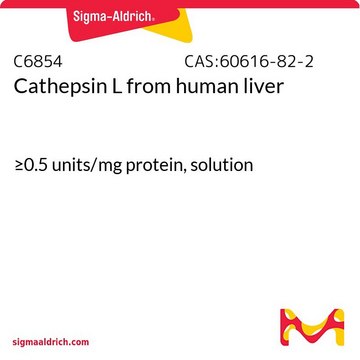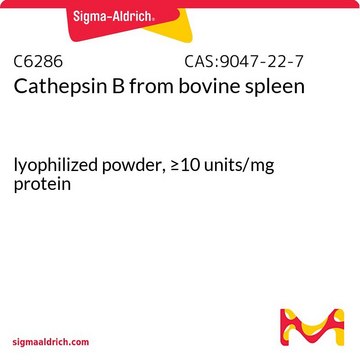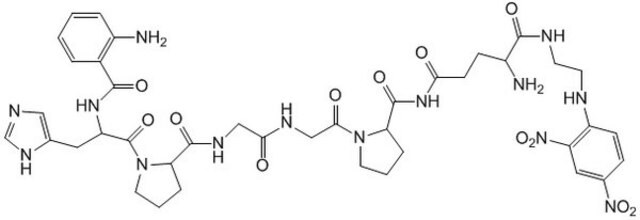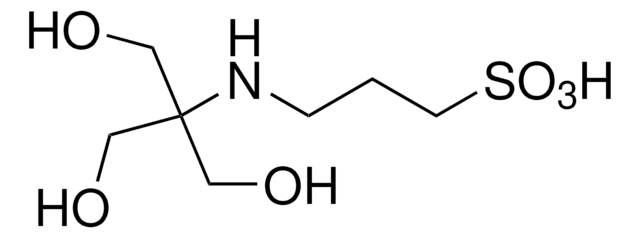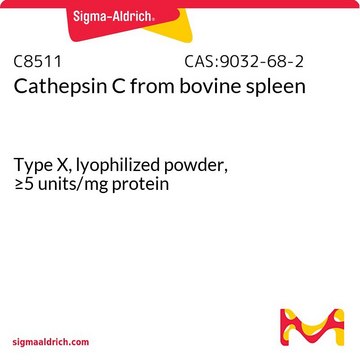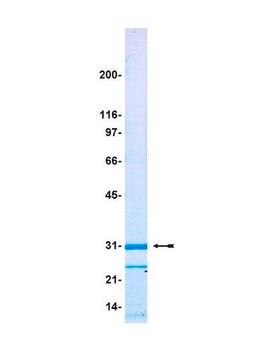219461
Cathepsin K, His•Tag®, Human, Recombinant, E. coli
Cathepsin K, His•Tag, Human, Recombinant, E. coli, CAS 94716-09-3, of the papain superfamily of cysteine proteinases plays a role in osteoclast-mediated bone resorption and collagen degradation.
Faça loginpara ver os preços organizacionais e de contrato
About This Item
Número CAS:
Número MDL:
Código UNSPSC:
12352202
NACRES:
NA.77
Produtos recomendados
recombinante
expressed in E. coli
Nível de qualidade
Ensaio
≥95% (SDS-PAGE)
Formulário
liquid
atividade específica
≥900 mU/mg protein
fabricante/nome comercial
Calbiochem®
condição de armazenamento
OK to freeze
avoid repeated freeze/thaw cycles
Condições de expedição
wet ice
temperatura de armazenamento
−70°C
Descrição geral
Cathepsin K is a member of the papain superfamily of cysteine proteinases and plays an important role in osteoclast-mediated bone resorption and collagen degradation. It is primarily expressed by osteoclasts and recent studies also suggest its expression in fibroblasts. Irregularities in cathepsin K activity, either too high or too low, contribute to osteopenic disorders such as osteoporosis and pycnodysostosis. This recombinant enzyme contains a C-terminal His•Tag sequence.
Note: 1 mU = 1 milliunit.
Embalagem
Please refer to vial label for lot-specific concentration.
Advertência
Toxicity: Standard Handling (A)
Definição da unidade
One unit is defined as the amount of enzyme that will hydrolyze 0.4 µmol Z-FR-AMC per min at 37°C, pH 5.5.
forma física
In 50 mM NaOAC, pH 5.5. The activation was stopped by addition of 10 mM MMTS, which can be removed under reducing conditions.
Reconstituição
Following initial thaw, aliquot and freeze (-70°C).
Outras notas
Delaisse, J.M., et al. 2003. Microsc. Res. Tech.61, 504.
Dodds, R.A. 2003. Cell Biochem. Funct.21, 231.
Everts, V., et al. 2003. Calcif. Tissue Int.73, 380.
Hou, W.S., et al. 2003. Biol. Chem.384, 891.
Dodds, R.A. 2003. Cell Biochem. Funct.21, 231.
Everts, V., et al. 2003. Calcif. Tissue Int.73, 380.
Hou, W.S., et al. 2003. Biol. Chem.384, 891.
Informações legais
CALBIOCHEM is a registered trademark of Merck KGaA, Darmstadt, Germany
HIS TAG is a registered trademark of Merck KGaA, Darmstadt, Germany
Código de classe de armazenamento
12 - Non Combustible Liquids
Classe de risco de água (WGK)
nwg
Ponto de fulgor (°F)
Not applicable
Ponto de fulgor (°C)
Not applicable
Certificados de análise (COA)
Busque Certificados de análise (COA) digitando o Número do Lote do produto. Os números de lote e remessa podem ser encontrados no rótulo de um produto após a palavra “Lot” ou “Batch”.
Já possui este produto?
Encontre a documentação dos produtos que você adquiriu recentemente na biblioteca de documentos.
Xiao-Yu Yuan et al.
Bioorganic & medicinal chemistry, 27(6), 1034-1042 (2019-02-19)
Selective proteinase inhibitors have demonstrated utility in the investigation of cartilage degeneration mechanisms and may have clinical use in the management of osteoarthritis. The cysteine protease cathepsin K (CatK) is an attractive target for arthritis therapy. Here we report the
Nossa equipe de cientistas tem experiência em todas as áreas de pesquisa, incluindo Life Sciences, ciência de materiais, síntese química, cromatografia, química analítica e muitas outras.
Entre em contato com a assistência técnica
